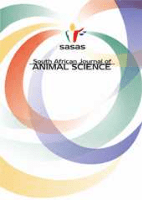
SOUTH AFRICAN JOURNAL OF ANIMAL SCIENCE
Scope & Guideline
Innovating research in animal welfare and nutrition.
Introduction
Aims and Scopes
- Animal Nutrition and Feed Science:
Research on the nutritional needs of various livestock species, including studies on feed formulation, feed additives, and alternative feed sources aimed at improving growth performance, health, and meat quality. - Animal Genetics and Breeding:
Investigations into genetic factors affecting growth, reproduction, and disease resistance in different animal breeds, along with studies on breeding strategies for improved performance. - Animal Health and Welfare:
Studies focusing on the health management of livestock, including disease prevention, treatment protocols, and welfare assessments in various production systems. - Meat Quality and Processing:
Research examining factors influencing meat quality attributes, processing techniques, and the impact of dietary interventions on meat characteristics. - Sustainable Animal Production:
Exploration of sustainable practices in livestock production, including resource management, environmental impacts, and economic viability of different farming systems.
Trending and Emerging
- Functional Feed Additives:
There is a growing interest in the use of functional feed additives, such as probiotics, prebiotics, and essential oils, aimed at improving animal health and performance. - Precision Livestock Farming:
Emerging studies focus on precision farming technologies, including the use of sensors and data analytics to enhance animal management and welfare. - Alternative Protein Sources:
Research on alternative protein sources, such as insect meal and plant-based proteins, is on the rise, driven by the need for sustainable and eco-friendly feed options. - Climate Resilience in Animal Production:
The impact of climate change on livestock systems and the development of strategies to enhance resilience in animal production are becoming increasingly relevant. - Innovative Reproductive Technologies:
Studies exploring advanced reproductive technologies, including artificial insemination and embryo transfer, are gaining traction as a means to improve genetic progress and production efficiency.
Declining or Waning
- Traditional Breeding Methods:
There has been a noticeable decrease in research focused solely on traditional breeding techniques, possibly due to the increasing interest in genomic selection and advanced breeding technologies. - Conventional Feed Additives:
Research on conventional feed additives, particularly antibiotics, is declining as the industry shifts towards more natural and sustainable alternatives. - Invasive Species Impact Studies:
The focus on the impacts of invasive species on livestock production seems to be waning, likely overshadowed by more pressing concerns such as climate change and food security.
Similar Journals

CZECH JOURNAL OF ANIMAL SCIENCE
Advancing Knowledge in Animal ScienceThe Czech Journal of Animal Science, published by the Czech Academy Agricultural Sciences, is a premier open-access journal dedicated to advancing research in the fields of animal science and zoology. With an impressive ranking of Q2 in its category for 2023, it underscores its significance within the academic community, evidenced by its Scopus rank of #197 out of 490 in Animal Science and Zoology, placing it in the 59th percentile among peers. The journal has been a crucial platform for scholarly communication since its inception and has embraced open access since 2004, ensuring that research is widely available to a global audience. Targeted toward researchers, professionals, and students, the journal publishes high-quality original research, review articles, and case studies that contribute to the understanding and enhancement of animal science practices. Its commitment to rigorous peer review and its broad scope undoubtedly solidify its role as an essential resource for those engaged in animal research and agriculture, fostering continued innovation and knowledge transfer in this vital sector.

Revista de Investigaciones Veterinarias del Peru
Transforming Veterinary Practices with Groundbreaking ResearchRevista de Investigaciones Veterinarias del Peru, published by UNIV NACIONAL MAYOR SAN MARCOS, stands as a pivotal resource within the field of veterinary sciences. With its ISSN 1682-3419 and E-ISSN 1609-9117, this journal aims to publish innovative research contributing to the advancement of veterinary practices and animal health. Since its inception in 1999, it has fostered an academic platform for professionals and researchers alike to share findings that are crucial for understanding and improving animal welfare in Peru and beyond. Although currently positioned in the Q3 category of Veterinary (miscellaneous) and ranked #163 out of 194 in the Scopus database, the journal's commitment to quality research and open access to veterinary knowledge continues to attract submissions and readership from a diverse audience. As it moves forward into 2024, the Revista de Investigaciones Veterinarias del Peru remains dedicated to disseminating critical insights that promote evidence-based practices in the veterinary field, stimulating further research and collaboration across continents.
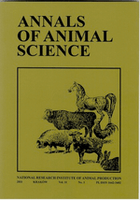
Annals of Animal Science
Driving Excellence in Animal Science StudiesAnnals of Animal Science is a prestigious academic journal, published by Walter de Gruyter GmbH in Germany, specializing in the multifaceted field of Animal Science. With an ISSN of 1642-3402 and an E-ISSN of 2300-8733, this journal is recognized for its high-impact contributions, holding a commendable impact factor that demonstrates its relevance in nurturing quality research. The journal has garnered Q2 rankings in 2023 across various categories including Animal Science and Zoology, Food Animals, and Small Animals. Notably, its Scopus Rankings indicate an elite standing, with the journal placing in the top 10% within its specific fields. Covering converged years from 2008 to 2024, the Annals of Animal Science serves as an essential platform for researchers, professionals, and students to disseminate knowledge and advance studies related to animal health, welfare, and production. The journal also emphasizes open access, promoting broader accessibility to foster collaboration and innovation in Animal Science globally. For those committed to advancing their understanding of veterinary and agricultural sciences, this journal is a vital resource.

Tropical Animal Science Journal
Unleashing Potential in Food Animal Science and Veterinary CareTropical Animal Science Journal, ISSN 2615-787X, E-ISSN 2615-790X, is an esteemed open-access journal published by the Bogor Agricultural University, Faculty of Animal Science. Launched in 2018, this journal serves as a pivotal platform for disseminating high-quality research in the fields of Animal Science, Food Animals, and Veterinary Medicine. With its significant presence in Indonesia and a commitment to scientific innovation, it has achieved a Q3 ranking in Animal Science and Zoology and Food Animals, as well as a Q2 ranking in Veterinary (miscellaneous) as of 2023. The journal also enjoys favorable Scopus rankings, placing it in the 61st percentile for General Veterinary and demonstrating its relevance and impact in the academic community. As an advocate for open-access publishing since its inception, the journal enhances accessibility to critical research findings, making it an invaluable resource for researchers, professionals, and students alike who aim to advance their knowledge and contribute to the fields of tropical animal science.
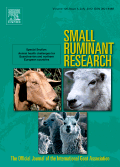
SMALL RUMINANT RESEARCH
Elevating research standards in animal science.SMALL RUMINANT RESEARCH is a premier academic journal committed to advancing the field of animal science, specifically focusing on the study and management of small ruminants. Published by Elsevier, this esteemed journal holds a significant standing, ranked in the Q2 category for both Animal Science and Zoology as well as Food Animals in 2023, reflecting its influence and relevance in the academic community. With an ISSN of 0921-4488 and an E-ISSN of 1879-0941, it disseminates high-quality research that encompasses a wide spectrum of topics, including nutrition, genetics, health, and management practices for sheep and goats. Although it does not offer open access, the journal ensures rigorous peer review and publishes articles that aim to bridge research gaps and promote best practices among industry practitioners. With its contribution to knowledge spanning from 1988 to 2024, SMALL RUMINANT RESEARCH serves as an essential resource for researchers, practitioners, and students dedicated to the enhancement of small ruminant production and welfare.

TROPICAL ANIMAL HEALTH AND PRODUCTION
Advancing animal health in tropical landscapes.Tropical Animal Health and Production is a prominent academic journal dedicated to advancing the field of animal health and production in tropical environments. Published by Springer, this journal has been a pivotal platform for researchers and professionals since its inception in 1969, serving as a vital resource for innovative studies and advancements up to 2024. With impactful research findings, it holds a respectable Q2 ranking in both Animal Science and Zoology, and Food Animals, demonstrating its significance within these fields. The journal’s commitment to high-quality research is further reflected in its Scopus rankings, with a notable position in Agricultural and Biological Sciences and Veterinary Food Animals. Although it is not an open-access publication, the insights and knowledge shared within its pages are invaluable for those engaged in tackling the challenges of animal health and production in the tropics. Researchers and students will find Tropical Animal Health and Production an essential source for the most recent advancements and practices in veterinary science and animal care for food-producing species.

CANADIAN JOURNAL OF ANIMAL SCIENCE
Advancing Animal Science Knowledge Since 1975Canadian Journal of Animal Science, published by Canadian Science Publishing, stands as a pivotal platform in the fields of Animal Science and Zoology, reflecting its commitment to advancing knowledge and research in these crucial areas. Operating since 1975, with dedicated publication since 1993, this journal boasts an impactful history and has established itself within the academic community, holding a 2023 Q2 category rank in Animal Science and Zoology, and a Q3 rank in Food Animals. With its ISSN 0008-3984 and E-ISSN 1918-1825, the journal is accessible to a wide audience, promoting collaboration and the dissemination of innovation across borders. Although not an open-access journal, its valuable insights and research findings serve as essential resources for researchers, professionals, and students striving to enhance their understanding of animal science, veterinary studies, and agricultural practices. As the field of animal science continues to evolve, the Canadian Journal of Animal Science remains a vibrant and influential part of this dynamic landscape.
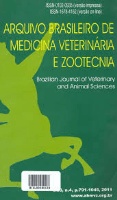
ARQUIVO BRASILEIRO DE MEDICINA VETERINARIA E ZOOTECNIA
Bridging knowledge gaps in veterinary and animal sciences.ARQUIVO BRASILEIRO DE MEDICINA VETERINARIA E ZOOTECNIA, an esteemed publication in the field of veterinary medicine and animal science, has been a vital resource for researchers and professionals since its inception in 1996. Published by the ARQUIVO BRASILEIRO MEDICINA VETERINARIA ZOOTECNIA, this journal is recognized for its open-access model, allowing widespread dissemination of knowledge since 1999. With a 2023 Scopus ranking placing it in the 25th percentile within the veterinary field, ARQUIVO BRASILEIRO is categorized in Q3 in Veterinary (miscellaneous), highlighting its commitment to scholarly excellence. The journal's scope encompasses a diverse range of topics related to veterinary medicine and zootechnics, making it a crucial platform for advancing research and professional practice. Situated in Belo Horizonte, Minas Gerais, Brazil, it serves not only the local community but also an international audience, fostering collaboration and innovation in veterinary sciences. As such, ARQUIVO BRASILEIRO is an invaluable asset for students, researchers, and practitioners looking to stay at the forefront of veterinary research.
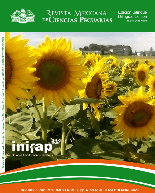
Revista Mexicana de Ciencias Pecuarias
Fostering Collaboration in Veterinary Medicine and ResearchRevista Mexicana de Ciencias Pecuarias, published by INIFAP-CENID PARASITOLOGIA VETERINARIA, is a prominent open-access journal since 2010 that caters to the fields of Animal Science and Veterinary Medicine. Based in Mexico, this journal addresses critical issues in animal health, production, and welfare, making it instrumental for researchers, professionals, and students seeking to advance their knowledge and practices. With an impact factor that reflects its growing influence, particularly in the Q3 quartile rankings in both Animal Science and Zoology as well as Veterinary (Miscellaneous) categories, the journal provides a vital platform for the dissemination of innovative research and findings. Additionally, its Scopus Ranks position highlights its role in publishing significant contributions to the fields of Veterinary Science and Agricultural Biology. The journal fosters a collaborative learning environment through its open-access model, ensuring that valuable insights are accessible to a wide audience. For those committed to enhancing animal well-being and advancing veterinary practices, the Revista Mexicana de Ciencias Pecuarias stands as a key resource through its rigorous peer-reviewed publication process and commitment to scientific excellence.
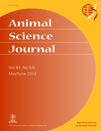
ANIMAL SCIENCE JOURNAL
Exploring Innovations in Agricultural and Biological SciencesAnimal Science Journal, published by Wiley, stands as a premier platform for advancing knowledge in the fields of Agricultural and Biological Sciences, Animal Science and Zoology, and Food Science. With an ISSN of 1344-3941 and an E-ISSN of 1740-0929, this journal not only enjoys a commendable Q2 ranking across multiple categories, reflecting its significance and impact within the academic community, but it also ranks within the top percentiles in terms of Scopus rankings. Operating out of the United Kingdom, the journal covers a broad spectrum of research topics relevant to animal science, encompassing both theoretical insights and practical applications. While it is not an open access journal, it remains an essential resource for researchers and practitioners eager to enhance their understanding of animal sciences, contribute to ongoing debates, and stay abreast of the latest findings from 2003 through 2024. Scholar engagement and innovative research are central to the journal’s objectives, making it an invaluable asset for students, professionals, and academics alike.